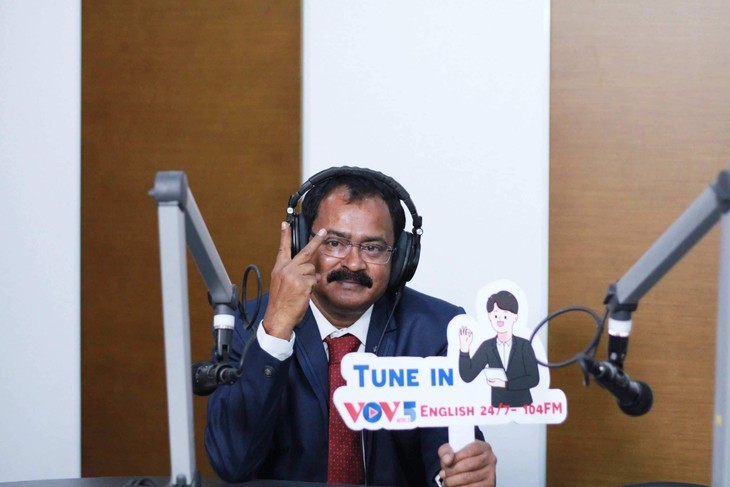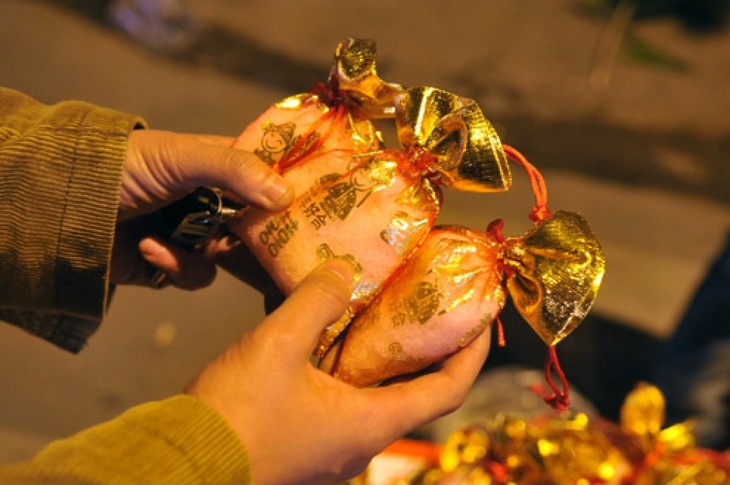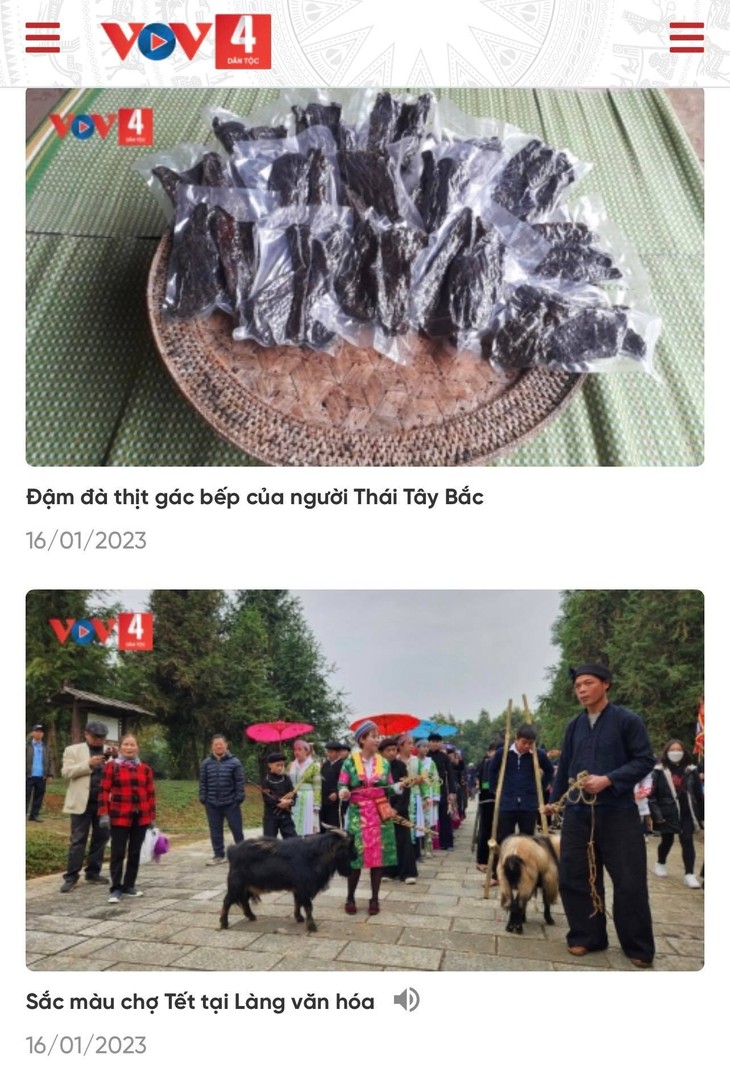B: Thank you all for your greetings on World Radio Day and for being loyal to radio broadcasts. Your interest in radio is a source of great encouragement for us to continue our service.
 UNESCO World Radio is celebrated on February 13. UNESCO World Radio is celebrated on February 13. |
A: On this occasion, VOV’s Vice President Ngo Minh Hien delivered a speech to radio broadcasters and audiences.
B: Rabi Sankar Bosu of India extended their greetings on World Radio Day upholding the UNESCO theme for this year: “Radio and Peace.”
 Rabi Sankar Bosu, Founder and President of New Horizon Radio Listeners' Club, West Bengal, India, in VOVWorld’s studio. Rabi Sankar Bosu, Founder and President of New Horizon Radio Listeners' Club, West Bengal, India, in VOVWorld’s studio. |
A: Bidhan Chandra Sanyal of India wrote: “One of the means of wireless communication is wireless or radio. As the oldest, most accessible and powerful media, wireless is a device widely used around the world. Thanks to technology, today we get news, entertainment and information very easily through various media. But one day like today, radio listeners of different countries around the world gather. February 13 was first announced as World Radio Day at the 36th Annual Conference of UNESCO in 2011.”
B: He continued: “The theme of the 12th edition of World Radio Day is Radio and Peace. I strongly believe that radio can play a very important role in establishing world peace. Only cooperation, initiatives and efforts should be used. Finally, on World Radio Day, I extend my sincere love and best wishes to all radio lovers, officers of organizations, radio crews and listeners.”
A: Once again, thank you all for supporting VOV broadcasts and sticking with us for many many years despite the explosion of new media on digital platforms.
B: This week, VOVWorld received 395 letters and emails from listeners of 38 countries and territories.
A: Many listeners sent us greetings for the 93rd founding anniversary of the Communist Party of Vietnam. Armando Francisco Higuera del Reyo of Mexico wrote: “From Mexico, we’d like to send greetings to all Vietnamese people on the occasion of the 93rd founding anniversary of the Communist Party of Vietnam. Founded on February 3, the Communist Party of Vietnam is the political leading force of Vietnam. I congratulate the the Communist Party of Vietnam for making exceptional achievements.”
B: From Santander, Spain, Juan Diez said he is interested in stories about the celebration of the 170th birth anniversary of Cuban national hero Jose Marti, who laid the foundation for the Vietnam-Cuba relationship.
A: Many listeners expressed their interest in Vietnamese traditions, customs, and festivals during the traditional lunar New Year and early days of spring. Andy Martynyuk of Russia wrote: “I wish you all a New Year of prosperity, health and success. I hope we will be stronger connected.”
B: Chalinal Sip and many other listeners wrote that they are interested in stories about Tet traditions and salt buying customs on the first day of the lunar year. Chalinal Sip wrote: “Thank you very much. I learned a new custom about buying salt on the early days of the year and buying limes at the end of the year.”
 Salt is wrapped in small bags and sold to people on Lunar New Year's Day (Photo: vcci.com) Salt is wrapped in small bags and sold to people on Lunar New Year's Day (Photo: vcci.com) |
A: Buying salt is a traditional custom that Vietnamese people have observed for centuries. It is the belief among many citizens that salt is anti-defiling and is able to successfully ward off evil spirits whilst bringing good luck for family members. Therefore, it is common to see local people sprinkle salt on the street and around the house in the hope that peace will prevail.
B: Furthermore, the custom also comes from the Vietnamese proverb, “Salt is salty, ginger is hot and spicy”, with salt being considered a symbol of affection, bonding, and fullness. People therefore buy salt at the beginning of the year so that their family will enjoy harmony with all members remaining close-knit.
A: In northern regions, local people believe that purchasing salt at the beginning of the year will bring them good luck for the whole year.
B: In contrast, during the final days of the previous lunar year, people tend to buy lime to refurbish their house and to avoid any bad luck.
A: When the clock strikes midnight to mark the transition between the old and new year, some people can be seen walking along the streets selling salt. The seller will measure a full bowl of salt with a top which symbolizes abundance and auspices.
B: Another meaning of buying salt is the hope to save money at the beginning of the year in order to purchase lime that can be used to “build a house” at the end of the year.
A: After bringing it home, the buyer then divides the salt into small plastic bags or cloth bags for storage. Traders can then put the salt bags at the stall in order to pray for good fortune. Indeed, traveling far from home with a small bag of salt can also bring about a good journey, according to tradition.
B: Heinz Gunter Hessenbruch of Germany said he likes stories about ethnic minority groups and asked about the preservation of ethnic minority languages in Vietnam.
A: Vietnam is a multi-ethnic and multilingual country. In addition to Vietnamese being used as a common language, 53 ethnic minorities also have their own languages. However, due to different conditions, many languages are preserved and spread while many are in danger of disappearing.
 Snapshot of vov4.vov.vn website which covers broadcasts in ethnic language of VOV4 Channel for Ethnic Affairs Snapshot of vov4.vov.vn website which covers broadcasts in ethnic language of VOV4 Channel for Ethnic Affairs |
B: According to the Vietnam Academy of Social Sciences and Vietnam National University, Hanoi, some ethnic minority languages at high risk of disappearing include Arem, Ma Lieng, and Ruc which belong to ethnic groups with very few people, from a few hundred to about 1,000 who are living in difficult circumstances and rarely use their languages.
A: Vietnam has adopted legal documents and established many agencies and research and training institutions to preserve and promote ethnic minority languages.
B: The Vietnamese Party and State consider ethnic languages one of the elements that make up national cultural identity. A number of languages of large ethnic groups such as Khmer, Ede, and Gia Rai are now available on radio and TV. Some have also been used to print literary and artistic works, compile bilingual dictionaries, grammar description books, and textbooks.
A: At VOV, we have a VOV4 Channel broadcasting in 13 ethnic minority languages throughout Vietnam. Some local stations also produce programs in ethnic minority languages.
B: Next, we’d like to acknowledge feedback from Mr. Riski Rosianto of Indonesia, who listened to our broadcast on February 3 on the frequency of 9840 kHz and rated SINPO at all 5s.
A: This week, we received a Christmas and New Year greeting card from Richard Chen of Trinidad and Tobago, which came a little late but brought us great joy.
B: Thank you, Richard Chen, very much for your greetings. We wish you all the best of luck and happiness for the New Year and hope to receive more regular feedback from you.
A: We continued to receive letters from Fumito Hokamura of Japan and his reception reports for our broadcast on the frequency 12020 khz.
B: We’d like to thank Kenji Nishida of Japan for sending us several postal stamps to add to our collection of listeners’ correspondence. Thank you all for your interest in VOV and for sending us your feedback.
A: We welcome your feedback at: English Service, VOVWorld, the Voice of Vietnam, 45 Ba Trieu street, Hanoi, Vietnam. Or you can email us at: englishsection@vov.vn. You’re invited to visit us online at vovworld.vn, where you can hear both live and recorded programs.
B: Check out our VOV Media App, available on both the IOS and Android platforms, to hear our live broadcasts. We look forward to your feedback on the mobile version of vovworld.vn. Once again, thank you all for listening. Goodbye!